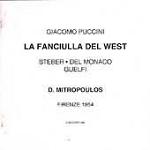This is a thrilling performance of Puccini’s most interesting opera. Premiered in 1910 at the Metropolitan Opera, for which its American theme was chosen, Toscanini conducted and Caruso, Emmy Destinn, and Antonio Scotti starred. It was greeted coolly–and frankly, has been ever since. An opera that takes place during the California Gold Rush is an odd subject; Americans found it quaint and Europeans didn’t find it as exotic as the composer might have hoped. And though the blood-and-guts drama, in which our heroine Minnie cheats at poker with the Scarpia-like Sheriff, Jack Rance, for the life of her bandit-boyfriend Dick Johnson, is riveting while you’re watching it, the moments of silly text–“Whiskey per tutti!”, “Salute a Mister Ashby dell’Agenzia Wells Fargo”, and the refrain “Doo dah doo dah day”–tend to keep credibility at a distance. This, coupled with the lack of quick, easy tunes (although after a couple of hearings, the opera’s rich melodic vein becomes evident) have kept the work in the background.
Tonally, it is Puccini’s most advanced work, with more than a hint of French Expressionism (not “Impressionism” mind you), and it is scored more ornately than any of his operas with the exception of Turandot. The soprano and tenor roles are his most challenging, and it takes a conductor who really believes in the work and can find the beauty in the music behind the text “Addio mia California”. If there were more performances like the one recorded here, live in Florence in 1954, the work might catch on.
Minnie is known as “Puccini’s Valkyrie” (Birgit Nilsson recorded it), but here it is sung–brilliantly, beautifully, accurately, sensitively–by Eleanor Steber, hardly a Wagnerian, merely a great soprano. She sang the role often and it never hurt her–unlike Leontyne Price, who sang it once and swore off it forever, canceling the rest of a run. Johnson is sung by Mario del Monaco, for whose leathery lungs, huge sound, and tireless spirit it seems to have been composed. He’s at his best, and even manages some nicely nuanced singing. The equally imposing-voiced baritone Gian Giacomo Guelfi sings Rance with a vengeance–missing, in fact, the occasional moment of sadness and tenderness in the character–but he’s otherwise grand. The rest of the cast is fine.
Dimitri Mitropoulos leads a big, rock-’em, sock-’em performance while managing to find all the loveliness in the first-act finale’s love duet and in all of Minnie’s tender moments. He opens a cut in the almost impossible second-act Minnie/Johnson duet as well, which is most welcome–and the singers can handle it. The orchestra and chorus are excellent, but the sonics are pretty bad–blaring and nasty. Still, this is a thrilling reading of a Puccini opera the world ought to know better. [06/23/2004]
































